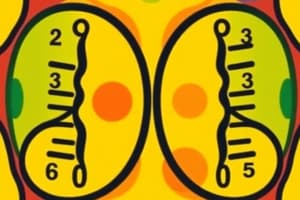Podcast
Questions and Answers
What phenotypic ratio is expected from a dihybrid cross involving Tall Round, Tall Wrinkled, Dwarf Round, and Dwarf Wrinkled traits?
What phenotypic ratio is expected from a dihybrid cross involving Tall Round, Tall Wrinkled, Dwarf Round, and Dwarf Wrinkled traits?
- 1:2:1
- 3:1
- 9:3:3:1 (correct)
- 4:1:1
In the context of co-dominance, which example correctly illustrates this genetic pattern?
In the context of co-dominance, which example correctly illustrates this genetic pattern?
- Black and white patched fur in a cat (correct)
- Red and white flowers yielding pink flowers
- Blue and yellow feathers producing green feathers
- A tiger having orange and brown stripes
Which genotype indicates an individual is affected by Huntington's disease?
Which genotype indicates an individual is affected by Huntington's disease?
- aa
- Aaa
- Aa (correct)
- AA (correct)
How can you determine the sex of an individual from a karyotype?
How can you determine the sex of an individual from a karyotype?
In pedigree analysis, which of the following typically denotes a male?
In pedigree analysis, which of the following typically denotes a male?
What is the genetic content of the daughter cells produced by meiosis?
What is the genetic content of the daughter cells produced by meiosis?
Which of the following correctly describes a cladogram?
Which of the following correctly describes a cladogram?
In which type of plant are flower parts typically found in multiples of 4 or 5?
In which type of plant are flower parts typically found in multiples of 4 or 5?
How many daughter cells are produced at the end of mitosis?
How many daughter cells are produced at the end of mitosis?
What is the phenotype represented by the genotype 'bb'?
What is the phenotype represented by the genotype 'bb'?
Which of the following processes occurs in sex cells?
Which of the following processes occurs in sex cells?
What is a key feature of Monocotyledonae?
What is a key feature of Monocotyledonae?
In a Punnett square, what probability represents the chance of obtaining the 'bb' genotype?
In a Punnett square, what probability represents the chance of obtaining the 'bb' genotype?
Study Notes
Chromosome Numbers
- Haploid cells have one set of chromosomes (n), while diploid cells have two sets (2n).
- Calculate chromosome numbers based on cell type: Somatic cells are typically diploid; sex cells are haploid.
Evolutionary Biology
- Cladograms represent evolutionary relationships; understand sequential characteristics of organisms to construct them accurately.
DNA Structure
- Nucleotides consist of three components: sugar, nitrogenous base (adenine, thymine, cytosine, guanine), and phosphate group.
- Understanding base pairing is crucial for calculating percentages of DNA bases, where adenine pairs with thymine, and cytosine pairs with guanine.
Cell Division
- Mitosis results in two identical daughter cells, maintaining the diploid number (2n); occurs in somatic cells.
- Meiosis produces four genetically diverse daughter cells, each with a haploid number (n); occurs in sex cells or gonads.
- Compare mitosis and meiosis based on number of divisions, types of daughter cells, genetic material, and occurrence sites.
Plant Development and Angiosperm Classification
- Angiosperms classified into two main groups:
- Monocotyledonae: Features include parallel leaf venation, flower parts in multiples of three, shallow roots, and one seed leaf (cotyledon).
- Dicotyledonae: Characterized by net-like leaf venation, flower parts in multiples of four or five, and a taproot system.
Genetics and Heredity
- Monogenic inheritance involves single traits; blue eyes represented as "bb" (recessive) and brown eyes as "B" (dominant).
- Use Punnett squares to predict probabilities of offspring traits; example: 50% chance of "bb" for blue eyes.
- Dihybrid inheritance examines two traits simultaneously, such as tallness (T) and pea shape (R); phenotypic ratio typically 9:3:3:1.
Complex Inheritance Patterns
- Incomplete dominance results in a blended phenotype (e.g., red and white flowers producing pink).
- Co-dominance shows both traits equally (e.g., cats with black and white fur patches).
Genetic Disorders and Pedigrees
- Huntington's Disease displayed by dominant allele "A"; practice predicting genotypes using pedigree charts.
- Familiarize with family relationships represented in pedigrees, such as identifying cousins.
Karyotyping
- Determine sex of an individual through a karyogram; XX indicates female and XY indicates male.
- Assess chromosome arrangements for normal or abnormal configurations.
Studying That Suits You
Use AI to generate personalized quizzes and flashcards to suit your learning preferences.
Description
Test your knowledge on haploid and diploid cells, including the roles of somatic and sex cells in chromosome number calculation. Additionally, explore the structures of DNA, the process of mitosis and meiosis, and how these processes contribute to genetic variation. This quiz covers fundamental concepts in evolutionary biology and genetics.




